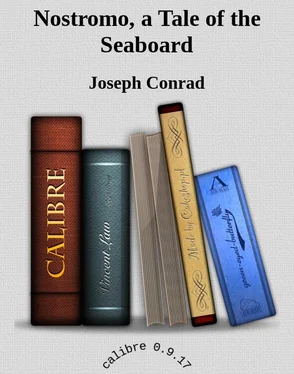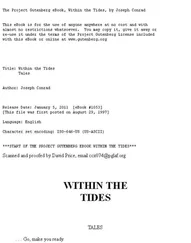Joseph Conrad - Nostromo, a Tale of the Seaboard
Здесь есть возможность читать онлайн «Joseph Conrad - Nostromo, a Tale of the Seaboard» весь текст электронной книги совершенно бесплатно (целиком полную версию без сокращений). В некоторых случаях можно слушать аудио, скачать через торрент в формате fb2 и присутствует краткое содержание. Жанр: Старинная литература, на английском языке. Описание произведения, (предисловие) а так же отзывы посетителей доступны на портале библиотеки ЛибКат.
- Название:Nostromo, a Tale of the Seaboard
- Автор:
- Жанр:
- Год:неизвестен
- ISBN:нет данных
- Рейтинг книги:4 / 5. Голосов: 1
-
Избранное:Добавить в избранное
- Отзывы:
-
Ваша оценка:
- 80
- 1
- 2
- 3
- 4
- 5
Nostromo, a Tale of the Seaboard: краткое содержание, описание и аннотация
Предлагаем к чтению аннотацию, описание, краткое содержание или предисловие (зависит от того, что написал сам автор книги «Nostromo, a Tale of the Seaboard»). Если вы не нашли необходимую информацию о книге — напишите в комментариях, мы постараемся отыскать её.
Nostromo, a Tale of the Seaboard — читать онлайн бесплатно полную книгу (весь текст) целиком
Ниже представлен текст книги, разбитый по страницам. Система сохранения места последней прочитанной страницы, позволяет с удобством читать онлайн бесплатно книгу «Nostromo, a Tale of the Seaboard», без необходимости каждый раз заново искать на чём Вы остановились. Поставьте закладку, и сможете в любой момент перейти на страницу, на которой закончили чтение.
Интервал:
Закладка:
Charles Gould had turned round to listen patiently, leaning his elbow on the balustrade. He shook his head a little, refusing, almost touched by the anxious gaze of the President of the Provincial Assembly. It was not Charles Gould's policy to make the San Tome mine a party to any formal proceedings.
"My advice, senores, is that you should wait for your fate in your houses. There is no necessity for you to give yourselves up formally into Montero's hands. Submission to the inevitable, as Don Juste calls it, is all very well, but when the inevitable is called Pedrito Montero there is no need to exhibit pointedly the whole extent of your surrender. The fault of this country is the want of measure in political life. Flat acquiescence in illegality, followed by sanguinary reaction—that, senores, is not the way to a stable and prosperous future."
Charles Gould stopped before the sad bewilderment of the faces, the wondering, anxious glances of the eyes. The feeling of pity for those men, putting all their trust into words of some sort, while murder and rapine stalked over the land, had betrayed him into what seemed empty loquacity. Don Juste murmured—
"You are abandoning us, Don Carlos. . . . And yet, parliamentary institutions—"
He could not finish from grief. For a moment he put his hand over his eyes. Charles Gould, in his fear of empty loquacity, made no answer to the charge. He returned in silence their ceremonious bows. His taciturnity was his refuge. He understood that what they sought was to get the influence of the San Tome mine on their side. They wanted to go on a conciliating errand to the victor under the wing of the Gould Concession. Other public bodies—the Cabildo, the Consulado—would be coming, too, presently, seeking the support of the most stable, the most effective force they had ever known to exist in their province.
The doctor, arriving with his sharp, jerky walk, found that the master had retired into his own room with orders not to be disturbed on any account. But Dr. Monygham was not anxious to see Charles Gould at once. He spent some time in a rapid examination of his wounded. He gazed down upon each in turn, rubbing his chin between his thumb and forefinger; his steady stare met without expression their silently inquisitive look. All these cases were doing well; but when he came to the dead Cargador he stopped a little longer, surveying not the man who had ceased to suffer, but the woman kneeling in silent contemplation of the rigid face, with its pinched nostrils and a white gleam in the imperfectly closed eyes. She lifted her head slowly, and said in a dull voice—
"It is not long since he had become a Cargador—only a few weeks. His worship the Capataz had accepted him after many entreaties."
"I am not responsible for the great Capataz," muttered the doctor, moving off.
Directing his course upstairs towards the door of Charles Gould's room, the doctor at the last moment hesitated; then, turning away from the handle with a shrug of his uneven shoulders, slunk off hastily along the corredor in search of Mrs. Gould's camerista.
Leonardo told him that the senora had not risen yet. The senora had given into her charge the girls belonging to that Italian posadero. She, Leonarda, had put them to bed in her own room. The fair girl had cried herself to sleep, but the dark one—the bigger—had not closed her eyes yet. She sat up in bed clutching the sheets right up under her chin and staring before her like a little witch. Leonarda did not approve of the Viola children being admitted to the house. She made this feeling clear by the indifferent tone in which she inquired whether their mother was dead yet. As to the senora, she must be asleep. Ever since she had gone into her room after seeing the departure of Dona Antonia with her dying father, there had been no sound behind her door.
The doctor, rousing himself out of profound reflection, told her abruptly to call her mistress at once. He hobbled off to wait for Mrs. Gould in the sala. He was very tired, but too excited to sit down. In this great drawing-room, now empty, in which his withered soul had been refreshed after many arid years and his outcast spirit had accepted silently the toleration of many side-glances, he wandered haphazard amongst the chairs and tables till Mrs. Gould, enveloped in a morning wrapper, came in rapidly.
"You know that I never approved of the silver being sent away," the doctor began at once, as a preliminary to the narrative of his night's adventures in association with Captain Mitchell, the engineer-in-chief, and old Viola, at Sotillo's headquarters. To the doctor, with his special conception of this political crisis, the removal of the silver had seemed an irrational and ill-omened measure. It was as if a general were sending the best part of his troops away on the eve of battle upon some recondite pretext. The whole lot of ingots might have been concealed somewhere where they could have been got at for the purpose of staving off the dangers which were menacing the security of the Gould Concession. The Administrador had acted as if the immense and powerful prosperity of the mine had been founded on methods of probity, on the sense of usefulness. And it was nothing of the kind. The method followed had been the only one possible. The Gould Concession had ransomed its way through all those years. It was a nauseous process. He quite understood that Charles Gould had got sick of it and had left the old path to back up that hopeless attempt at reform. The doctor did not believe in the reform of Costaguana. And now the mine was back again in its old path, with the disadvantage that henceforth it had to deal not only with the greed provoked by its wealth, but with the resentment awakened by the attempt to free itself from its bondage to moral corruption. That was the penalty of failure. What made him uneasy was that Charles Gould seemed to him to have weakened at the decisive moment when a frank return to the old methods was the only chance. Listening to Decoud's wild scheme had been a weakness.
The doctor flung up his arms, exclaiming, "Decoud! Decoud!" He hobbled about the room with slight, angry laughs. Many years ago both his ankles had been seriously damaged in the course of a certain investigation conducted in the castle of Sta. Marta by a commission composed of military men. Their nomination had been signified to them unexpectedly at the dead of night, with scowling brow, flashing eyes, and in a tempestuous voice, by Guzman Bento. The old tyrant, maddened by one of his sudden accesses of suspicion, mingled spluttering appeals to their fidelity with imprecations and horrible menaces. The cells and casements of the castle on the hill had been already filled with prisoners. The commission was charged now with the task of discovering the iniquitous conspiracy against the Citizen-Saviour of his country.
Their dread of the raving tyrant translated itself into a hasty ferocity of procedure. The Citizen-Saviour was not accustomed to wait. A conspiracy had to be discovered. The courtyards of the castle resounded with the clanking of leg-irons, sounds of blows, yells of pain; and the commission of high officers laboured feverishly, concealing their distress and apprehensions from each other, and especially from their secretary, Father Beron, an army chaplain, at that time very much in the confidence of the Citizen-Saviour. That priest was a big round-shouldered man, with an unclean-looking, overgrown tonsure on the top of his flat head, of a dingy, yellow complexion, softly fat, with greasy stains all down the front of his lieutenant's uniform, and a small cross embroidered in white cotton on his left breast. He had a heavy nose and a pendant lip. Dr. Monygham remembered him still. He remembered him against all the force of his will striving its utmost to forget. Father Beron had been adjoined to the commission by Guzman Bento expressly for the purpose that his enlightened zeal should assist them in their labours. Dr. Monygham could by no manner of means forget the zeal of Father Beron, or his face, or the pitiless, monotonous voice in which he pronounced the words, "Will you confess now?"
Читать дальшеИнтервал:
Закладка:
Похожие книги на «Nostromo, a Tale of the Seaboard»
Представляем Вашему вниманию похожие книги на «Nostromo, a Tale of the Seaboard» списком для выбора. Мы отобрали схожую по названию и смыслу литературу в надежде предоставить читателям больше вариантов отыскать новые, интересные, ещё непрочитанные произведения.
Обсуждение, отзывы о книге «Nostromo, a Tale of the Seaboard» и просто собственные мнения читателей. Оставьте ваши комментарии, напишите, что Вы думаете о произведении, его смысле или главных героях. Укажите что конкретно понравилось, а что нет, и почему Вы так считаете.












